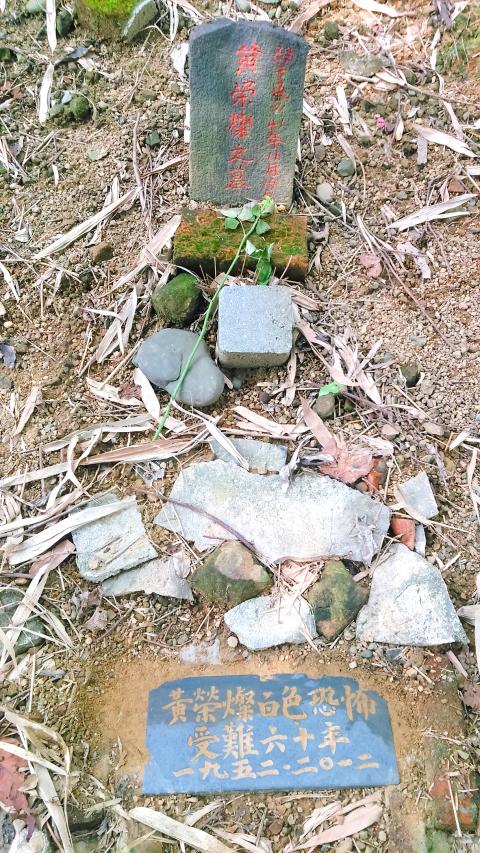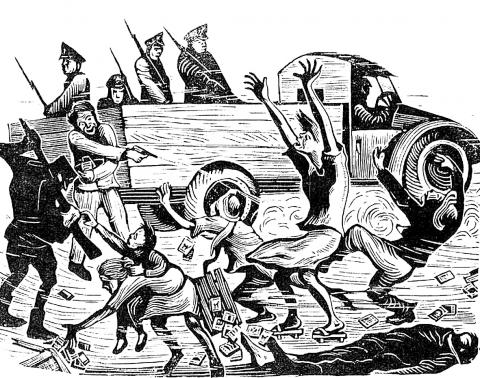The families of nearly 200 people killed in the beginning of the White Terror era have complained that a memorial park in Taipei’s Liuzhangli (六張犁) commemorating the victims of political persecution has fallen into disrepair due to government negligence, an act of neglect they branded as being disrespectful of the dead.
The Park Commemorating Victims of Political Persecution during the Martial Law Period’s (戒嚴時期政治受難者紀念公園) First Cemetery on Chongde Street in the city’s Xinyi District (信義) is covered with leaves and weeds, and strewn with cement bricks. Some of its tombstones have been toppled over, and trash and empty bottles lie strewn everywhere.
The memorial was established in 2003 to honor nearly 200 victims of political persecution between 1949 and 1953. Each tombstone is no bigger than a brick, on which the name of the victim and the date of their death are inscribed.

Photo: Chen Yen-chun, Taipei Times
One of the victims’ family members who complained about the park’s upkeep, a woman surnamed Huang (黃), said a cemetery manager has been put in charge of the facility’s maintenance, but due to its size and a lack of staff, the task of maintaining the park was next to impossible.
She expressed hope that the government would be more attentive to the issue and properly take on the responsibility for the park’s maintenance.
Taipei Mortuary Services Office Director Wu Kun-hong (吳坤宏) said the office outsourced the maintenance of the graveyard to a cleaning company at the beginning of the year, but the contract was terminated due to the company’s financial instability. The government will find a new contractor to take over the task, he added.

Photo: Chen Yen-chun, Taipei Times
Lin Chuan-kai (林傳凱), a researcher who has worked for years on the history of the White Terror era and its victims, said the public sector has taken only nominal care of the memorial park since its establishment, with most of the cleaning being done by the victims’ families and related groups.
However, the topography and relatively soft soil of the First Cemetery site make it necessary for the authorities to carry out any restoration efforts, Lin said.
He suggested that the government better publicize information about the people interred at the cemetery who lost their lives in the White Terror era and produce a visitor’s guide to the monuments to help the public better understand this period in the nation’s history.
Among the many renowned figures honored at the park is Huang Jung-tsan (黃榮燦), who created the now famous printed engraving The Horrifying Inspection (恐怖的檢查) in the aftermath of the 228 Incident.
The 228 Incident refers to the brutal military crackdown launched by the then-Chinese Nationalist Party (KMT) regime against civilian demonstrations in 1947, following an incident in Taipei on Feb. 27.
The event marked the beginning of the White Terror era, in which tens of thousands of Taiwanese were killed, went missing or were imprisoned as the government sought to stamp out dissent and forbade any discussion of the Incident.

Chinese spouse and influencer Guan Guan’s (關關) residency permit has been revoked for repeatedly posting pro-China videos that threaten national security, the National Immigration Agency confirmed today. Guan Guan has said many controversial statements in her videos posted to Douyin (抖音), including “the red flag will soon be painted all over Taiwan” and “Taiwan is an inseparable part of China,” and expressing hope for expedited reunification. The agency last year received multiple reports alleging that Guan Guan had advocated for armed reunification. After verifying the reports, the agency last month issued a notice requiring her to appear and explain her actions. Guan

The Kaohsiung Tourism Bureau audited six hotels in an effort to prevent price gouging ahead of Korean band BTS’ concert tour in the city scheduled for Nov. 19, 21 and 22 this year. The bureau on Friday said that the audits — conducted in response to allegations of unfair pricing posted on social media — found no wrongdoing. These establishments included the local branches of Chateau de Chine, Hotel Nikko, My Humble House, and Grand Hai Lai, it said, adding that the Consumer Protection Commission would have penalized price gougers had the accusations been substantiated. The bureau said the Tourism Development Act

BACK TO WINTER: A strong continental cold air mass would move south on Tuesday next week, bringing colder temperatures to northern and central Taiwan A tropical depression east of the Philippines could soon be upgraded to be the first tropical storm of this year, the Central Weather Administration (CWA) said yesterday, adding that the next cold air mass is forecast to arrive on Monday next week. CWA forecaster Cheng Jie-ren (鄭傑仁) said the first tropical depression of this year is over waters east of the Philippines, about 1,867km southeast of Oluanpi (鵝鑾鼻), and could strengthen into Tropical Storm Nokaen by early today. The system is moving slowly from northwest to north, and is expected to remain east of the Philippines with little chance of affecting Taiwan,

The military yesterday said it has located the flight data recorder, or black box, of an F-16V jet that disappeared off eastern Taiwan earlier this month, and it would soon deploy a salvage team to try to retrieve it. Air Force Command Headquarters said that while it had pinned down the location of the black box, it was still searching for the aircraft’s sole pilot, air force Captain Hsin Po-yi (辛柏毅). Without providing details, the air force said it had located the black box days after detecting some intermittent signals and would now engage a team of professionals to retrieve it. The air